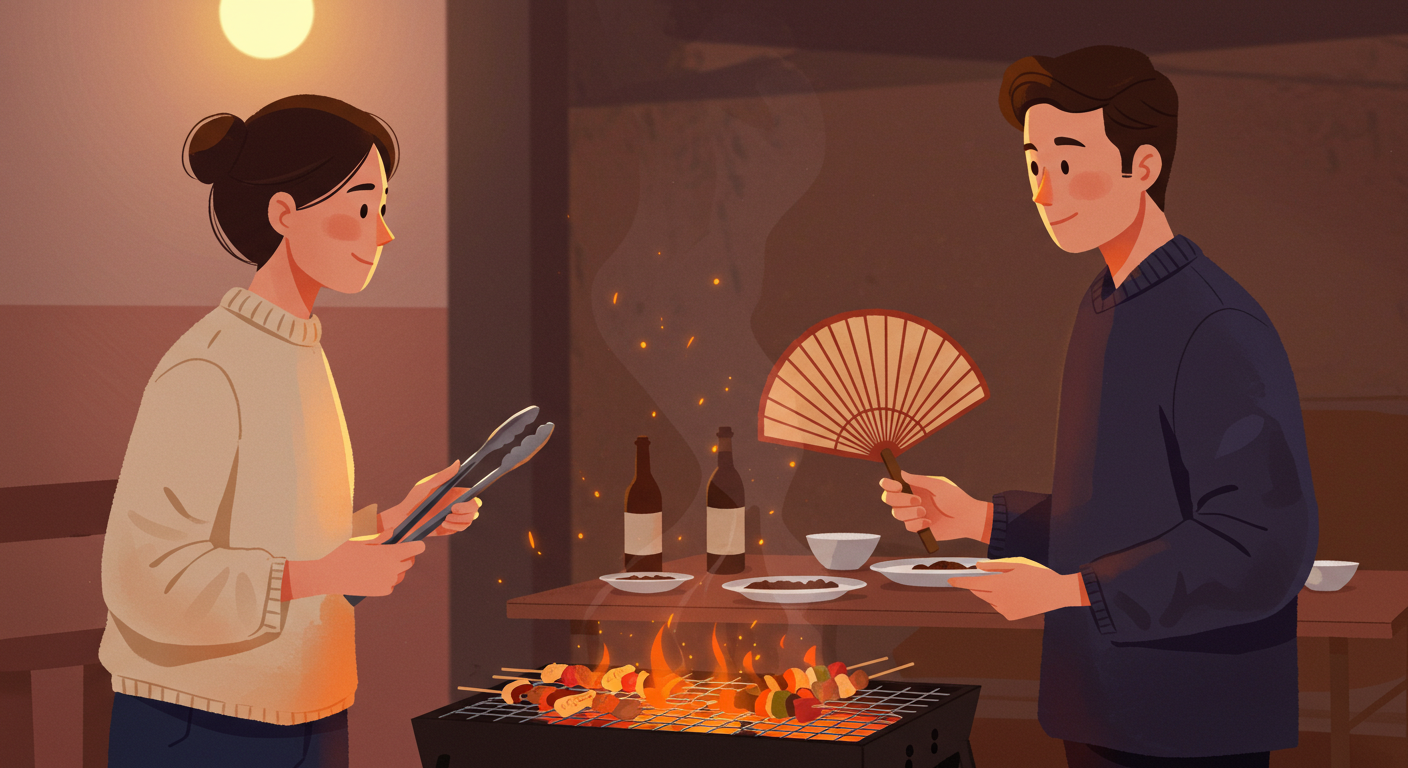今天是中秋節!🌕 台灣人最期待的當然就是「烤肉」啦~
不管你是跟同學、家人還是男女朋友一起,BBQ 一定少不了聊天、分工、還有吃不完的笑料。
在這篇文章中,我們就要學會「Mid-Autumn BBQ English」——從邀約、分工到烤焦救援(😆),讓你開口就像母語人士!
🎧Apple Podcast | Spotify
💬 對話 Dialogue:Today’s BBQ Party
Lily、Jay兩人一起準備中秋烤肉,邊聊天邊分工
🗣️ English Dialogue
Lily: Hey Jay, did you bring the charcoal?
Jay: Yeah, I got it! But… I forgot the matches. 😅
Lily: Seriously? How are we gonna start the fire then?
Jay: Maybe we can borrow a lighter from that group over there.
Lily: Good idea. Oh, You’ve marinated the meat already, right?
Jay: Already done! I used soy sauce and garlic—classic Taiwanese style.
Lily: Nice! Let’s also grill some corn and sweet potatoes later.
Jay: Sure! I love sweet potatoes. They smell amazing when they’re roasted.
Lily: Watch out, the fire’s too strong—you’re gonna burn the meat!
Jay: Oops! My bad. Guess I’m not a BBQ master yet.
Lily: Haha, practice makes perfect! Let’s eat before the moon comes out.
Jay: Deal! Nothing beats a Mid-Autumn BBQ with good friends.
中文
Lily: 嘿 Jay,你有帶木炭嗎?
Jay: 有啊我帶了!但我忘了帶火柴 😅
Lily: 真的假的?那我們要怎麼生火?
Jay: 或許可以跟那邊那群人借打火機。
Lily: 不錯的主意~對了,你肉有先醃過了吧?
Jay: 已經醃好了!我用醬油跟蒜頭——台式經典!
Lily: 太棒了!等等也烤點玉米跟地瓜吧。
Jay: 好啊!我超愛地瓜的,烤起來超香。
Lily: 小心!火太大了,你肉快烤焦啦~
Jay: 哎呀我的錯,看來我還不是烤肉達人。
Lily: 哈哈,多練幾次就會啦(熟能生巧)~趕快開吃吧!
Jay: 好啊!沒有什麼比中秋節和好友一起烤肉更棒了
📚 Vocabulary Boost 重點單字
| 單字 / 片語 | 詞性 | 中文意思 | 英文例句 | 中文翻譯 |
|---|---|---|---|---|
| charcoal | n. | 木炭 | Don’t forget to bring the charcoal for the BBQ. | 別忘了帶烤肉用的木炭。 |
| matches | n. | 火柴 | We can’t start the fire without matches. | 沒有火柴就不能生火。 |
| start the fire | phr. | 生火 | It’s hard to start the fire on a windy day. | 風大的時候很難生火。 |
| marinate the meat | phr. | 醃肉 | I always marinate the meat with soy sauce. | 我總是用醬油醃肉。 |
| grill | v. | 烤 | Let’s grill some corn and sweet potatoes. | 我們來烤點玉米跟地瓜吧。 |
| sweet potatoes | n. | 地瓜 | Sweet potatoes taste great when roasted. | 烤地瓜超好吃。 |
| burn the meat | phr. | 把肉烤焦 | Don’t burn the meat again! | 別再把肉烤焦啦! |
| classic Taiwanese style | phr. | 經典台式風味 | The sauce is classic Taiwanese style. | 這醬汁是經典台式風味。 |
| practice makes perfect | idiom | 熟能生巧 | Don’t worry, practice makes perfect. | 別擔心,熟能生巧。 |
| nothing beats | idiom | 沒有比…更棒的 | Nothing beats a BBQ with friends. | 沒有什麼比和朋友烤肉更棒的! |
🔍 Sentence Patterns 重點句型
| 句型結構 | 中文意思 | 英文例句 | 中文翻譯 |
|---|---|---|---|
| Did you bring…? | 你有帶…嗎? | Did you bring the charcoal? | 你有帶木炭嗎? |
| How are we gonna…? | 我們要怎麼…? | How are we gonna start the fire? | 我們要怎麼生火? |
| Don’t forget to… | 別忘了… | Don’t forget to marinate the meat. | 別忘了醃肉喔。 |
| Watch out! | 小心! | Watch out! The fire’s too strong. | 小心!火太大了。 |
| Guess I’m not… yet. | 看來我還不是… | Guess I’m not a BBQ master yet. | 看來我還不是烤肉達人。 |
| Practice makes perfect. | 熟能生巧 | Practice makes perfect, right? | 熟能生巧,對吧? |
| Nothing beats… | 沒有比…更棒的 | Nothing beats a Mid-Autumn BBQ. | 沒有比中秋烤肉更棒的! |
📖 Transcript 逐字稿
M: Welcome back to MJ English! Today’s episode feels super local — very Taiwanese.
M:歡迎回到 MJ English!今天這集感覺超本土的——非常有台灣味。
J: Oh? Sounds like food’s involved again.
J:喔?聽起來又是跟食物有關喔。
M: You guessed it. It’s Mid-Autumn Festival week — time for BBQs at the riverside, smoky air everywhere, and that chill holiday vibe.
M:你猜對了,這週是中秋節——就是去河堤烤肉、空氣都是煙味、超級放鬆的節日氛圍。
J: The classic Taiwanese BBQ scene — good food, good laughs… and usually, something goes wrong.
J:啊~那個經典的台式烤肉場景——好吃的食物、歡笑聲……然後通常一定會出點包。
M: Exactly! Today we’re listening in on two friends, Lily and Jay. They’re getting ready for their BBQ, buying supplies, setting things up… and trying not to mess everything up.
M:沒錯!今天我們要聽的是兩位朋友 Lily 和 Jay,他們正準備要烤肉,買東西、佈置場地……然後努力不要搞砸。
J: Sounds just like my friends every year — someone always forgets something.
J:聽起來就像我朋友每年一樣——每次都一定有人忘記帶什麼。
M: That’s why it’s perfect for learning some super practical English — how to ask things like “Did you bring the charcoal?” or “The fire’s too strong!”
M: 這就是為什麼這情境超適合學一些超實用英文,比如像「你有帶木炭嗎?」或「火太大了!」這種句子。
J: Alright, let’s get into it.
J:好啦,我們開始吧!
Lily、Jay兩人一起準備中秋烤肉,邊聊天邊分工
🗣️ English Dialogue
Lily: Hey Jay, did you bring the charcoal?
Jay: Yeah, I got it! But… I forgot the matches. 😅
Lily: Seriously? How are we gonna start the fire then?
Jay: Maybe we can borrow a lighter from that group over there.
Lily: Good idea. Oh, You’ve marinated the meat already, right?
Jay: Already done! I used soy sauce and garlic—classic Taiwanese style.
Lily: Nice! Let’s also grill some corn and sweet potatoes later.
Jay: Sure! I love sweet potatoes. They smell amazing when they’re roasted.
Lily: Watch out, the fire’s too strong—you’re gonna burn the meat!
Jay: Oops! My bad. Guess I’m not a BBQ master yet.
Lily: Haha, practice makes perfect! Let’s eat before the moon comes out.
Jay: Deal! Nothing beats a Mid-Autumn BBQ with good friends.
中文
Lily: 嘿 Jay,你有帶木炭嗎?
Jay: 有啊我帶了!但我忘了帶火柴 😅
Lily: 真的假的?那我們要怎麼生火?
Jay: 或許可以跟那邊那群人借打火機。
Lily: 不錯的主意~對了,你肉有先醃過了吧?
Jay: 已經好了!我用醬油跟蒜頭——台式經典!
Lily: 太棒了!等等也烤點玉米跟地瓜吧。
Jay: 好啊!我超愛地瓜的,烤起來超香。
Lily: 小心!火太大了,你肉快烤焦啦~
Jay: 哎呀我的錯,看來我還不是烤肉達人。
Lily: 哈哈,多練幾次就會啦(熟能生巧)~趕快開吃吧!
Jay: 好啊!沒有什麼比中秋烤肉更開心的事了!
M: Okay,that felt very, very real.
M:這情境太真實了啦。
M: So, let’s unpack the language here. What stood out?
M:那我們來解析一下今天的英文,哪些片語和句型有亮點?
J: Let’s start with the essentials. The supplies. Lily asks about the charcoal, and Jay admits he forgot the matches.
J:從基本用品開始。Lily 問有沒有帶木炭,Jay 就坦白他忘記帶火柴了。
M: And needing matches obviously leads to the problem of how to start the fire.
M:那缺火柴就會有「要怎麼生火」的問題啦。
J: And Lily’s question, “Did you bring…?” That’s just such a standard, useful way to check on things when you’re setting up, isn’t it?
J:而像 Lily 說的「Did you bring…?」這個句型就超實用,用來確認東西有沒有帶到,是布置或出遊的時候一定會用到的。
M: Absolutely. Basic but essential. Okay, moving on to the food prep.
M:完全同意。簡單卻很關鍵。好,接下來講到準備食材的部分。
J: The phrase “marinate the meat.” That’s key for any BBQ, really.
J:「(醃肉)」這個動作超重要,每次烤肉都一定會做。
M: And Jay specifies how he marinated it: “soy sauce and garlic, classic Taiwanese style.”
M:然後 Jay 還特別說他是怎麼醃的:「醬油跟大蒜,台式經典口味」。
J: That part’s important — the “classic Taiwanese style.” It’s not just listing ingredients. It adds a bit of cultural context, a bit of pride, maybe.
J:這句重點在「classic Taiwanese style」,不是單純講食材,而是帶出一點文化背景,甚至帶點台灣人的驕傲。
M: It shows you know what you’re doing, or at least what you’re aiming for. It sounds much better than just, “I put stuff on the meat.”
M:這表示你知道你在幹嘛,或至少你知道你要做出什麼風味。比「我把東西抹在肉上」這種說法好聽多了。
M: Then we get to the uh, near-disaster. The fire gets too strong.
M:好啦,然後我們來到一個「差點出事」的橋段。火太旺了。
J: And Lily shouts, “You’re gonna burn the meat!”
J:然後 Lily 大喊:「你會把肉烤焦啦!」
M: And Jay’s response, “Oops, my bad.”
M:然後 Jay 回:「哎呀,我的錯~」
J: That’s perfect, isn’t it? “My bad.” It’s so casual, friendly — like it acknowledges the mistake without making a big deal out of it.
J:這個回應超完美對吧?“My bad” 這句超級口語、也很友善——就是有承認錯誤,但又不會太嚴肅。
M: Right. It’s not formal like, “I sincerely apologize for overcooking the chicken.” It just fits the relaxed vibe.
M:對,它不像「我誠摯地為烤焦雞肉道歉」那麼正式,而是很符合整個輕鬆氣氛。
J: Super useful for sounding natural in these situations.
J:這種情境下要自然開口,“My bad” 超好用。
M: Totally. And then, to kind of smooth things over, Lily uses that great idiom…
M:沒錯。然後為了緩和氣氛,Lily 就用了那句經典的成語……
J: “Practice makes perfect.”
J:“熟能生巧”
M: It’s encouraging, right? Tells Jay it’s okay — happens to everyone. A good way to, you know, cheer someone up when they’ve messed up a little.
M:這句很鼓勵人吧?意思就是跟 Jay 說「沒關係啦,大家都會犯錯」,也是一種安慰人、幫朋友打氣的好方法。
J: It is, but it’s also a bit… sneaky, maybe. Like, it acknowledges they did mess up, but in a nice way.
J:是沒錯,但這句也有點……小奸詐,就是你有點「暗示對方搞砸了」,但又講得很有善。
M: That’s true. It softens it.
M:沒錯。這句話就是可以讓氣氛變軟一點。
M: So those are some key words and phrases. What about the sentence structures?
M:剛剛那些是重要單字跟片語。那句型部分呢?
J: Let’s look at patterns. First up, when they realize they have no matches, Lily asks, “How are we going to start the fire?”
J:我們來看幾個句型。首先,當他們發現沒帶火柴時,Lily 問:「我們要怎麼生火?」
M: The “How are we going to…” structure.
M:就是那個 “How are we going to…” 的句型。
J: So useful for any kind of problem-solving. “How are we going to get there?” “How are we going to finish this on time?” It invites collaboration.
J:這句型超級適合解決問題的情境。「我們要怎麼到那邊?」「我們要怎麼準時完成?」它聽起來就是邀請一起想辦法。
M: Good point. Very versatile. What else?
M:說得好,這句型真的萬用。還有呢?
J: The warning. Lily yelling, “Watch out! The fire’s too strong!”
J:警告的句型也很關鍵,像 Lily 大喊:「小心!火太大了!」
M: “Watch out!” Just quick, immediate.
M:對,「Watch out!」超即時又直接。
J: It’s an imperative. You use it for instant attention, usually for a minor, immediate danger. Bang — gets the message across way faster than, “Excuse me, Jay, it appears the flames are rather high.”
J:它是一個命令句,用來讓對方瞬間注意,通常用在小但急的危險。比起「Jay 不好意思,火好像有點大喔」,「Watch out!」快狠準多了。
J: The final line from Jay, the big wrap-up. “Nothing beats a Mid-Autumn BBQ with good friends.”
J:最後 Jay 的總結句:「Nothing beats a Mid-Autumn BBQ with good friends.」
M: The ultimate expression of enjoyment.
M:是表達你超愛某件事的終極句型。
J: Pretty much. It declares this is the peak experience, the best thing. You’re putting it on a pedestal.
J:沒錯,這就是在說:「這是最棒的體驗,其他都比不上。」
M: And you can use it for anything, right? “Nothing beats sleeping in on a Saturday.”
M:而且你可以套用在任何東西上對吧?像「星期六睡到自然醒沒人能比」。
J: “Nothing beats that first coffee in the morning.”
J:「早上第一杯咖啡最讚了,沒有東西能贏它。」
M: It’s just a really strong, positive way to end a thought or, in this case, sum up the whole experience. Pure satisfaction.
M:這是一個很強烈又正面的結尾句,不論是總結一個體驗,或只是分享心情,超有力。
J: Great stuff.
J:太讚了。
M: So, if you want a full transcript, all the key vocabulary we talked about, and these useful sentence patterns laid out…
M:所以如果你想拿到完整逐字稿、我們聊到的所有單字句型整理……
J: Just click the link below.
J:直接點下面的連結。
M: Go and try these out. Next time you’re having a great time, tell someone, “Nothing beats this.”
M:記得去試試看~下次你玩得很開心的時候,可以跟朋友說:「Nothing beats this!」
J: Yeah, put the language to use. Enjoy it.
J:對,語言就是要拿來用的~享受它!
M: Until next time, keep practicing.
M:我們下次見,繼續練習英文喔!
✅ Quick Check 小測驗
📌 延伸閱讀建議
- 【節慶英文】Moon Festival Vocabulary:中秋節相關英文一次學會
- 【生活英語】Outdoor Party Talk:戶外派對英文會話
- 【食物英文】Grilling & Cooking Verbs:烤肉動詞全攻略



